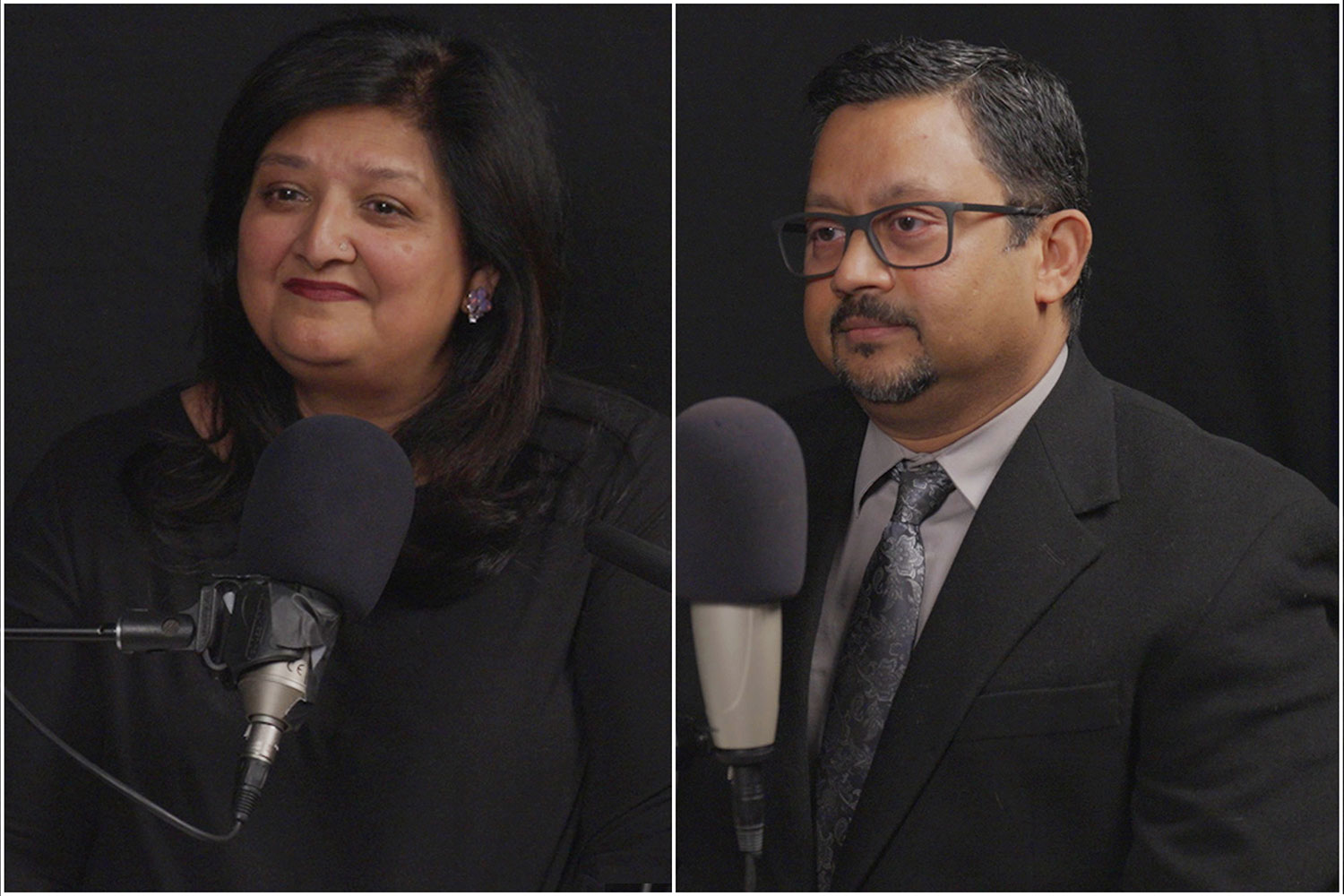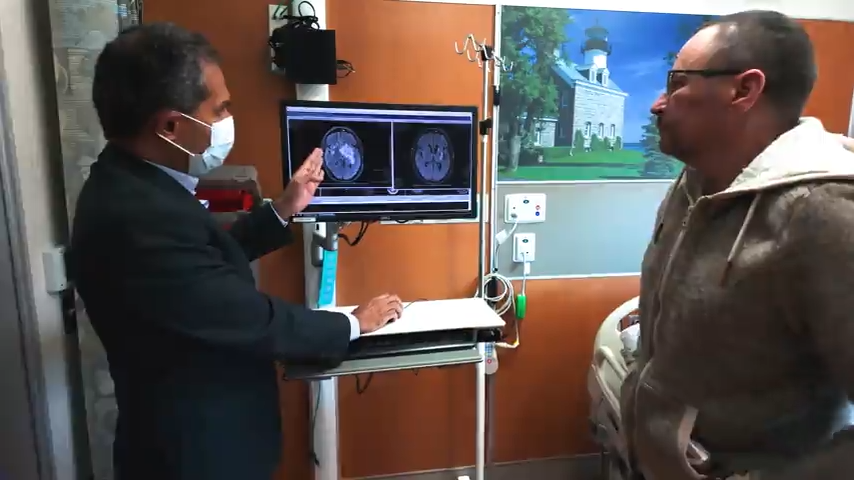They don’t call him “Super Dave” for nothing: David Bruno knows – and does – what it takes to get the job done.
Sometimes, he’s logging hours on a video chat with a student, talking about funding sources and customer discovery and next steps for their budding business idea.
And other times, he’s donning a tool belt, manning a compound miter saw, and wielding a power drill to help frame out a new physical workspace for a student’s growing company.

Bruno is a venture builder – a trade he’s practiced for the past decade – and he lends his talent to UConn students as the resident venture builder at the Peter J. Werth Institute for Entrepreneurship and Innovation.
“I feel like there’s no more noble or higher calling at the moment than creating jobs and economy for people,” Bruno says. “I want to create jobs. I want young people to feel motivated to go to work, and they really want to do something that’s important.”
Bruno honed his skills as a venture builder as the former head of innovation at global wealth manager UBS – creating and launching companies with support from the company and then selling them or reintegrating them into the firm.
After returning to the United States in 2019 after 25 years living in abroad, Bruno connected with Connecticut’s entrepreneur community – “There’s actually a scene, so to speak,” he says. “There’s people working on startups all the time.” – where he met David Noble, The Werth Institute’s director.
“What David’s trying to do, and what The Werth Institute is doing, is helping young people find the path that’s entrepreneurial in their lives,” Bruno says. “And I’m just in love with the students, basically. I love helping them find the path, because I’m older, and I have more experience, and you can give that to people and help them.”
The first student venture that Bruno consulted on was 2020’s Wolff New Venture Competition winner, Pisces Atlantic, founded by undergraduate student Peter Goggins ’21 (CAHNR). Since then, he’s worked with approximately 50 students in various programs of study to develop, refine, and take action on their entrepreneurial pursuits – including 2021’s Innovation Quest winner, first-year undergraduate student Raina Jain.
“David Bruno has brought a sell-first approach to collegiate entrepreneurs,” says Noble. “His unlimited generosity has driven him to help students that simply do not know the next step to starting a company. David has numerous creative solutions for helping students get their product in the view of potential customers, but better than creativity, his energy and ability to move quickly when an approach isn’t working drives home how hard the first set of sales beyond people you already know is for entrepreneurs to master.
Noble continues, “David does what traditional professors cannot do. He pays individualized attention to students that have a product ready for the real test of customer discovery – selling what you have and innovating from there.”
“When we came back to Connecticut after 25 years in Europe, it was with a purpose – I promised myself I would come back and make an impact here on people’s lives,” Bruno says. “Meeting Werth helped me fulfill this purpose and execute on it every day. That is something I am grateful for.”
In a recent interview, UConn Today asked “Super Dave” Bruno for his thoughts on entrepreneurship, what students can expect from working with him as a venture builder, and his advice to UConn students looking to pursue an entrepreneurial goal:
We often hear that entrepreneurship isn’t just starting companies; entrepreneurship is a mindset. Is that something you agree with?
I 100% agree with it, because entrepreneurship for me came at Year 25. I worked in corporations, and I was scared to be the direct entrepreneur that some of my college buddies were. Three years out of college, four years out, they quit their jobs and started companies and sold them. Some of my friends did this, and others are still in the corporate world today, and I was always walking the fine line. What I was able to do at UBS was find a way where I could live out my entrepreneurial dreams while not quitting.
And through that path you realize that there’s no one way. It’s not like there’s a clean cut, and you say, ‘now I’m a startup bro and I wear my headphones and my Patagonia vest and I live in Silicon Valley.’ That’s so clichéd. There’s so many other kinds of entrepreneurs. Some never leave corporations, but they start up new business lines that employ thousands of people. That’s entrepreneurship.
So we’ve got to respect that.
What can students expect when they come to you looking for your help?
I had one student recently – she spent the last three or four months observing a problem. And she actually sent out surveys to people, got N = 100 feedback, and then talked to 25 of them personally, and wrote down everything about that problem.
Now that’s someone who’s on a path, right? She’s just super into this problem. She doesn’t quite know how to solve it. She had a bunch of ideas. And so we just targeted in very quickly on what she could do that would get her traction, so to speak, toward solving that problem, and whether she should think about it with software, with a platform, with a marketplace, with an in-person offering, with a book, with a service – how do you do it?
So that’s what I do. I interview them, triage the situation like a doctor, and then try to set them on a path where they can actually see tangible results very quickly.
I do a lot of things for people, like just connect them with others who they might want to meet to get their business funded or to get a person into their company who could work on that, either technically or business-wise. I like to help, because I’m at that age where it’s more about giving than taking, and I wish more people would actually realize they hit that phase in life and do it.
What advice would you have for a UConn student who has an idea, but they really just don’t know where to go with it or what to do?
You’re in the ultimate petri dish! I mean, UConn is the best place. There’s so many people who actually will actively help you, unlike in the commercial world.
You’ve got The Werth Institute, and you have CCEI, and you have actually 50 other mechanisms in the schools and departments themselves to help. And you’ll end up at the dean’s desk very quickly.
What I’ve noticed is that the students who put their hands up, whether they’re a freshman, sophomore, or a grad student, they end up on our radar. And once you’re on the radar, once you’re on the scale, you end up with people like me and others – that can be a good or bad thing – but you get attention. And attention is a hard thing to come by.
So definitely put your hand up and make noise. I think that it’s what you make of it in life, and enjoy your time at university, but definitely put in and give to get, because the more you put up your hand, the more you’re going to get back from people.
It’s an awesome place to be.
Students can connect Super Dave Bruno on LinkedIn; through his venture building firm, Red Planet Ventures; or through The Werth Institute at entrepreneurship.uconn.edu.



